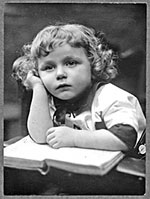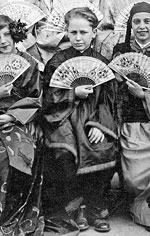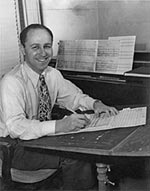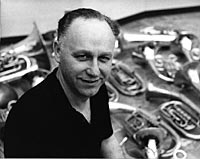 |
|
 Print this article Print this article
FMS FEATURE ARTICLE...

November 26, 2004
David
Remembrance of a treasured friend
by Jon Newsom
Chief of Music Division, The Library of Congress

David Raksin, 1915

In grammar school operetta, 1925
|
|
Editor's note: This personal reminiscence was
originally published in the program of a memorial service for David
Raksin on November 15, 2004 in Los Angeles, California.
Music is not translatable into words, yet, in the context of a
dramatic or poetic setting, it can, in the hands of such a master as
David Raksin, achieve expressive depths possible in no other art,
depths which probe the ineffable realm of human feeling with an acuity
impossible in words or pictures.
Yet words are all I am able to offer even though there is no word,
perhaps not even an evocative combination of words, that summons up a
particular feeling in David's best music of which I want to speak.
That feeling is melancholy but not sad, noble but not arrogant,
longing but not grasping, sentimental but not self-indulgent, resigned
but not despairing. Its passion is not suppressed yet it is poised,
even philosophical. The dark prophet Ezekiel might even find momentary
solace in its strains. Tristan and Isolde might hear in it the
troubled voice of King Mark. From where, one wonders, did this depth
of feeling come?
Frederick Delius, whose music, if not his character, David and many of
his generation admired especially for its harmonic richness, created a
mood both aspiring and sensual, and in a spirit of resignation
nurtured by the Dionysian philosophy of Nietzsche and the romantic
writings of the Danish poet Jens Peter Jacobsen. This hedonistic ethos
of a turn-of-the-last-century cult, however, was alien to David, who
was too much of a Jewish patriarch to permit its licentious undertones
to infect the noble despair and anger he felt as a tone-poet and
toiler in Jehovah's vineyards. Though not a conventionally religious
man, David had a more vivid image of God than most people I know, and
he was highly sensitive to the injustices his Creator could inflict,
not so much on himself but on his fellow men and women. Like Job,
David felt that his own ethical vision was superior to that of his
Maker.
| 
Photostrip taken during production of Transatlantic
Rhythm, captioned by David: "Monkey Bizness on the
Irish Sea" Sept. 1936, Blackpool
|
On saying this, I now hear in my mind's ear David's voice from the
beyond, filled with fatherly caution but not without nuances of
guarded approval such as one uses in addressing a zealous but
unseasoned disciple. He is saying to me: "Jon, you may be slightly
overstating the case." Yet I hear as clearly his voice the night more
than twenty years ago when we were discussing one of his favorite
characters, King Oedipus. The conversation turned logically and
passionately to another favorite fatherly character who was equally
buffeted – some believe by Fate, others by Fate's more willful
personification in the form of the Heavenly Father. I am speaking of
course of Abraham, Father Abraham who belongs to all inheritors of the
great desert religions. David knew exactly what he would have said to
God if ordered to sacrifice his only son, and he vented and I listened
with as much compassion as he had shown me when I was the outraged
friend in need of an understanding ear. And I urged him, with all my
powers as a commissioner of new music with money to offer, to set his
rage to music, or at least to consider setting one of Kierkegaard's
several variant versions of the story, each more horrendous and – as
David would say – "heart-rendering" than the preceding. Even better, I
suggested, take Benjamin Britten's approach and use Wilfred Owen's
version in which Abraham refuses not the Lord's but the Angel's
intervening command to hold his sword, and so, the poet writes, "slew
his son, and half the seed of Europe one-by-one." Unfortunately, David
did not feel up to the challenge.

David, 1940s
|
|
The urbane, wistful longing of Laura, the themes from The Bad
and the Beautiful, Forever Amber,
Too Late Blues, Carrie, or
Will Penny were not born, if anyone might suspect
they were, out of the sheer talent of a master craftsman in fulfilling
the demands of his profession, but out of David's compassionate and
embattled heart which sought to understand the pain felt by the loving
and complex people in the films he enriched and, to a great extent,
interpreted for their audiences and often, to their chagrin, the very
creators of those films who had hired him. He looked into their
characters' souls and often understood them more deeply than those
writers, directors, and actors who brought them to the screen only
partially developed and emotionally inarticulate before David's music
provided the nuances that make them believable and memorable. His
world was one of searching, discovering, and playing (he loved words
as much as notes). His world was also one of changes and the endless
partings effected by change. His music was both his outlet for grief
and his consolation.

David with horns, 1950s
|
|
He said once that he lived and worked in a golden age of Hollywood,
and that he and his colleagues knew that it was a golden age and that
they lived it to the hilt. He appreciated that for a brief time, a
composer of his special genius could write the kind of music he needed
to write and, most remarkably for any time in the history of music,
hear it played beautifully and immediately.

David has left us a musical legacy unique in its expressive powers,
and too rich to be superceded by changing fashions. It is also so
universal that it can with grace and style follow the hearts of an
Apache warrior, a king's mistress, or a detective who has fallen in
love with a portrait of a beautiful woman whose presumed death by
murder he is investigating.
We will each miss David the man in our own personal way. We will all
share, however, in the musical heritage he has left us and which will
remain for us and, we may hope, for many generations to come, as a
consolation until the ends of our lives.

|
 |


|




